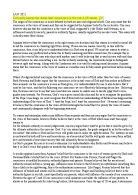Universal causation is “the theoretical or asserted law that every event or phenomenon results from, or is the sequel of, some previous event or phenomenon, which being present, the other is certain to take place.” This means that every event that has ever happened or ever will happen has been caused by an event that has previously occurred. This applies to the laws of nature, for example; every physical event that has happened in the natural world was caused due to these laws acting upon them. Due to the progression of science, we have been given the ability to describe and understand a number of these laws. However, there are some phenomenon of our world that still remains a mystery to us, for example; how human beings commit things to memory, it has puzzled scientists and psychologists alike for years.
One of the many arguments against determinism is this; ‘if determinism is true, is it morally correct to prosecute someone via the criminal justice system’. This argument has fairly solid ground to stand on. If one were to commit a murder, but that person was already predestined to commit said murder, is he or she really accountable for their actions which they had no choice but to commit, or is the being who initiated that action accountable?
At the opposite end of the spectrum, we have free will. Free will is defined as “the ability of agents to make choices free from certain kinds of restraints”. For years philosophers have debated the existence of free will and to what extent humans experience it. Compatibilists are people who are of the belief that free will and determinism co-exist. There are various different categories that come under compatibilism, two are; free will as a lack of physical constraint and free will as a psychological state.
Free will as a lack of physical constraint is relevant to most compatibilists. They claim that one is acting on free will when the it is the desire of the person to perform a certain act and to choose otherwise if he or she did not want to perform said act. Thomas Hobbes was one such person who believed in this form of compatibilism. Hobbes attributed such a compatibilist freedom to each individual and not to some far-fetched notion of will, asserting, for example, that "no liberty can be inferred to the will, desire, or inclination, but the liberty of the man; which consisteth in this, that he finds no stop, in doing what he has the will, desire, or inclination to do." In articulating this crucial proviso, David Hume writes, "this hypothetical liberty is universally allowed to belong to everyone who is not a prisoner and in chains"
People who believe in free will as a psychological state argue that a person’s choices are still free due to the wants and desires that they experience. A person's will is to be identified with their effective first-order desire, i.e., the one that they act on. For example, there are "wanting addicts", "unwilling addicts" and "willing addicts." All three groups may have the conflicting first-order desires to want to take the drug to which they are addicted and to not want to take it.
In conclusion, there are many different arguments for and against determinism and free will, all of which have equally strong points. Reiterating what has previously been said throughout this essay, determinism is the idea that human beings experience no free will what-so-ever and that everything that they have done and will do has been predetermined by a higher power. On the other hand there is free will, this is when people believe that they do as they wish because it is what they want.
John Norton
The Concise English Dictionary, 1982
http://dictionary.die.net/law%20of%20universal%20causation
http://en.wikipedia.org/wiki/Free_will








